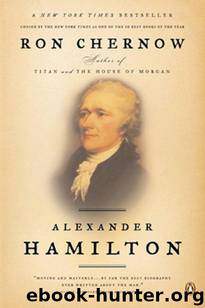Alexander Hamilton by Chernow Ron

Author:Chernow, Ron [Chernow, Ron]
Language: eng
Format: mobi, epub, azw3
Published: 2011-06-11T05:00:00+00:00
TWENTY-TWO
STABBED IN THE DARK
E
ven as their feud worsened, both Hamilton and Jefferson pleaded with Washington to stand for a second term as president. It may have been the sole thing that now united these sworn antagonists. Both men knew their
personal warfare could wreck the still fragile union and thought Washington the one man who could hold it together. “North and South will hang together if they have you to hang on,” Jefferson told the president.1 Hamilton had additional motives for seeking a second term for Washington. The president had been his indispensable patron, the steadfast supporter of his policies, granting him preeminent status in the cabinet. (In drafting his annual address to Congress that autumn, Washington solicited suggestions from all cabinet members, then assigned the speech to Hamilton.) A second term for Washington would aid another Hamiltonian objective: to strengthen executive power. His fears of legislative tyranny had only increased as congressional opposition to him had gathered force.
Since Washington’s victory seemed almost foreordained, the focus shifted to the vice presidential race. Unable to target the popular president directly, Republicans turned to the vice presidency as a referendum on Washington’s first term. Hamilton never wavered in supporting John Adams as vice president, a fact obscured by their later row. (Even Abigail Adams, we have seen, cheered on Hamilton as treasury secretary.) Writing to a Federalist congressman in October 1792, Hamilton conceded that “Mr. Adams, like other men, has his faults and his foibles”—faults and foibles that Hamilton himself eventually exposed. He admitted they held some differing views. For all that, Adams was “honest, firm, faithful, and independent, a sincere lover of his country, a real friend to genuine liberty....No man’s private character can be fairer than his. No man has given stronger proofs than him of disinterested
and intrepid patriotism.”2 Such glittering adjectives seldom flowed from Hamilton’s captious quill.
By nature, Hamilton was a busybody and could not refrain from offering Adams unsolicited advice. The vice president was a Federalist more by default than conviction—he prided himself on his grumpy independence and freedom from “party virulence”—and saw no need to make common cause with Hamilton.3 Distressed by rumors that Governor Clinton might challenge Adams for the vice presidency, Hamilton took it upon himself in June 1792 to warn Adams of “something very like a design to subvert the government.”4 Among Adams’s many quirks was a penchant for extended absences from Philadelphia. By early September, Hamilton feared that Adams’s prolonged sojourn at his home in Quincy, Massachusetts, might mar his reelection chances, and he sent him a tactfully worded note, urging him to return to the capital. His stay in Massachusetts “will give some handle to your enemies to misrepresent. And though I am persuaded you are very indifferent personally to the event of a certain election, yet I hope you are not so as it regards the cause of good government.”5
Adams was far from indifferent to the election’s outcome. John Ferling has noted, “There can be little doubt that Adams saw the vice-presidency as his best means by which to succeed President Washington.
Download
Alexander Hamilton by Chernow Ron.epub
Alexander Hamilton by Chernow Ron.azw3
This site does not store any files on its server. We only index and link to content provided by other sites. Please contact the content providers to delete copyright contents if any and email us, we'll remove relevant links or contents immediately.
| U.K. Prime Ministers | U.S. Presidents |
Waking Up in Heaven: A True Story of Brokenness, Heaven, and Life Again by McVea Crystal & Tresniowski Alex(37013)
Empire of the Sikhs by Patwant Singh(22176)
We're Going to Need More Wine by Gabrielle Union(18080)
Hans Sturm: A Soldier's Odyssey on the Eastern Front by Gordon Williamson(16715)
Leonardo da Vinci by Walter Isaacson(11912)
The Radium Girls by Kate Moore(10914)
Educated by Tara Westover(7071)
Tools of Titans by Timothy Ferriss(6956)
How to Be a Bawse: A Guide to Conquering Life by Lilly Singh(6697)
The Last Black Unicorn by Tiffany Haddish(5078)
Permanent Record by Edward Snowden(5004)
The Rise and Fall of Senator Joe McCarthy by James Cross Giblin(4850)
Promise Me, Dad by Joe Biden(4452)
The Wind in My Hair by Masih Alinejad(4427)
The Crown by Robert Lacey(4110)
A Higher Loyalty: Truth, Lies, and Leadership by James Comey(4038)
The Iron Duke by The Iron Duke(3642)
Joan of Arc by Mary Gordon(3262)
How to be Champion: My Autobiography by Sarah Millican(3190)
